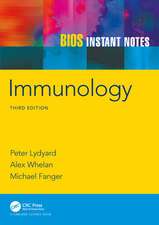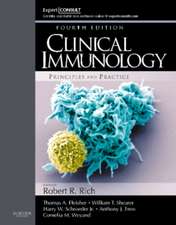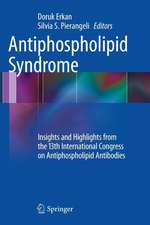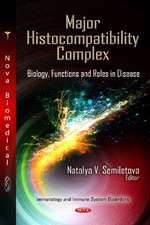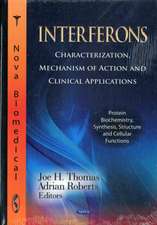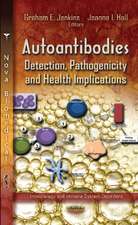Immunobiology of Proteins and Peptides—II: Advances in Experimental Medicine and Biology, cartea 150
Editat de M. Zouhair Atassien Limba Engleză Paperback – 12 dec 2012
Din seria Advances in Experimental Medicine and Biology
- 9%
 Preț: 719.56 lei
Preț: 719.56 lei - 5%
 Preț: 717.00 lei
Preț: 717.00 lei - 5%
 Preț: 717.00 lei
Preț: 717.00 lei - 15%
 Preț: 640.24 lei
Preț: 640.24 lei - 5%
 Preț: 715.71 lei
Preț: 715.71 lei - 5%
 Preț: 716.28 lei
Preț: 716.28 lei - 20%
 Preț: 691.93 lei
Preț: 691.93 lei - 5%
 Preț: 1031.00 lei
Preț: 1031.00 lei - 5%
 Preț: 820.42 lei
Preț: 820.42 lei - 5%
 Preț: 716.28 lei
Preț: 716.28 lei - 15%
 Preț: 641.38 lei
Preț: 641.38 lei - 5%
 Preț: 717.20 lei
Preț: 717.20 lei - 5%
 Preț: 715.35 lei
Preț: 715.35 lei - 5%
 Preț: 1113.83 lei
Preț: 1113.83 lei - 20%
 Preț: 1161.71 lei
Preț: 1161.71 lei - 5%
 Preț: 1170.51 lei
Preț: 1170.51 lei - 18%
 Preț: 1119.87 lei
Preț: 1119.87 lei - 5%
 Preț: 1288.48 lei
Preț: 1288.48 lei - 5%
 Preț: 1164.67 lei
Preț: 1164.67 lei - 5%
 Preț: 1101.73 lei
Preț: 1101.73 lei - 18%
 Preț: 1123.67 lei
Preț: 1123.67 lei - 5%
 Preț: 1435.64 lei
Preț: 1435.64 lei - 20%
 Preț: 1044.10 lei
Preț: 1044.10 lei - 18%
 Preț: 946.39 lei
Preț: 946.39 lei - 5%
 Preț: 292.57 lei
Preț: 292.57 lei - 18%
 Preț: 957.62 lei
Preț: 957.62 lei - 18%
 Preț: 1235.76 lei
Preț: 1235.76 lei - 5%
 Preț: 1231.55 lei
Preț: 1231.55 lei - 5%
 Preț: 1292.30 lei
Preț: 1292.30 lei - 5%
 Preț: 1102.10 lei
Preț: 1102.10 lei - 18%
 Preț: 1132.81 lei
Preț: 1132.81 lei - 5%
 Preț: 1165.19 lei
Preț: 1165.19 lei - 5%
 Preț: 1418.48 lei
Preț: 1418.48 lei - 5%
 Preț: 1305.63 lei
Preț: 1305.63 lei - 18%
 Preț: 1417.72 lei
Preț: 1417.72 lei - 18%
 Preț: 1412.99 lei
Preț: 1412.99 lei - 24%
 Preț: 806.15 lei
Preț: 806.15 lei - 18%
 Preț: 1243.29 lei
Preț: 1243.29 lei - 5%
 Preț: 1429.44 lei
Preț: 1429.44 lei - 5%
 Preț: 1618.70 lei
Preț: 1618.70 lei - 5%
 Preț: 1305.12 lei
Preț: 1305.12 lei - 18%
 Preț: 1124.92 lei
Preț: 1124.92 lei - 5%
 Preț: 1097.54 lei
Preț: 1097.54 lei - 15%
 Preț: 649.87 lei
Preț: 649.87 lei - 5%
 Preț: 1097.54 lei
Preț: 1097.54 lei - 18%
 Preț: 945.79 lei
Preț: 945.79 lei - 5%
 Preț: 1123.13 lei
Preț: 1123.13 lei - 20%
 Preț: 816.43 lei
Preț: 816.43 lei
Preț: 716.28 lei
Preț vechi: 753.97 lei
-5% Nou
Puncte Express: 1074
Preț estimativ în valută:
137.06€ • 143.46$ • 114.08£
137.06€ • 143.46$ • 114.08£
Carte tipărită la comandă
Livrare economică 31 martie-14 aprilie
Preluare comenzi: 021 569.72.76
Specificații
ISBN-13: 9781468443332
ISBN-10: 146844333X
Pagini: 244
Ilustrații: VIII, 230 p.
Dimensiuni: 178 x 254 x 13 mm
Greutate: 0.43 kg
Ediția:Softcover reprint of the original 1st ed. 1982
Editura: Springer Us
Colecția Springer
Seria Advances in Experimental Medicine and Biology
Locul publicării:New York, NY, United States
ISBN-10: 146844333X
Pagini: 244
Ilustrații: VIII, 230 p.
Dimensiuni: 178 x 254 x 13 mm
Greutate: 0.43 kg
Ediția:Softcover reprint of the original 1st ed. 1982
Editura: Springer Us
Colecția Springer
Seria Advances in Experimental Medicine and Biology
Locul publicării:New York, NY, United States
Public țintă
ResearchCuprins
Molecular Aspects of T- and B-Cell Recognition of Protein Antigens.- 1 Autoimmunity to Myelin Basic Protein.- 2 The Use of Hybridoma Antibodies to Probe the Antigenic Determinants of Thyroglobulin.- 3 The Major B and T Cell Determinant on Pigeon Cytochrome c in B10.A Mice.- 4 Helper T Cells Specific for Protein Antigens: Role of Self Major Histocompatibility Complex and Immunoglobulin Gene Products.- 5 Dissection of the Molecular Parameters for T-Cell Recognition of a Myoglobin Antigenic Site.- Genetic Control of the Immune Response to Proteins and Peptides.- 6 Genetic Control and Intersite Influences in the Immune Response to Sperm Whale Myoglobin.- 7 Genetic Control of the Immune Response to Hemoglobin and Its Subunits.- 8 Immune Response Gene Control of T Dependent Reactivity to Collagen in Man.- Regulation of the Immune Response.- 9 Myoglobin-Reactive T-Cell Clones.- 10 Use of T Cell Hybridomas in the Analysis of Helper T Cell Functions in B Cell Responses.- 11 Regulation of Growth and Differentiation in B Cell Clones and Hybrid.- 12 Immunological Studies with Tobacco Mosaic Virus Protein: Differential Activation of B Cell Subpopulations.- 13 Antigen Bridging in the Interaction of T Helper Cells and B Cells.

